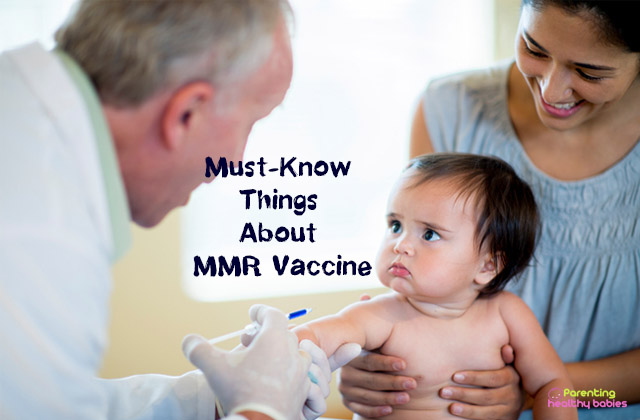Early childhood vaccines are one of the best ways to protect your child from serious diseases that can be especially dangerous for infants and very young children. By getting your child vaccinated, you can help keep your family and your community healthy. Be sure to ask the pediatrician for your child’s vaccine records. Infants and young children need vaccines to protect them from infections that can cause diseases like chickenpox, measles, and whooping cough.
MMR stands for measles, mumps and rubella. These are three different diseases which are caused by three different viruses. The vaccines given to immunize against measles, mumps and rubella (MMR) are all combined into one injection – the MMR vaccine. Combined live vaccine for measles, mumps and rubella (MMR) is used widely for the immunization of children in certain regions of the world because of its advantages over the individual vaccines. Combined vaccine provokes an adequate immune response in children simultaneously for the three infections and facilitates the implementation of current immunization strategies.
A dose of MMR vaccine is usually given to children aged 12-13 months. A second dose is usually given as a preschool booster. The MMR vaccine is safe and protects against illnesses which have the potential to lead to complications which can be very serious.
Measles, Mumps, Rubella(MMR)Vaccine: Dosage and Side Effects
Details
Measles is a highly contagious disease caused by a virus. Measles can occur in babies who have never had measles and have no immunity against it. The benefit of measles vaccination in preventing illness, disability, and death has been well documented. Those who survive, suffer from serious complications including diarrhea, pneumonia and malnutrition.
Mumps is another viral disease of childhood that was once very common. Mumps typically starts with fever, headache, muscle aches, tiredness, and loss of appetite. Then, most children will have swelling of their salivary glands. This is what causes the puffy cheeks and a tender, swollen jaw. Mumps can lead to meningitis, encephalitis, and deafness (rarely). It can also cause painful swelling of the testicles or ovaries.
Rubella, otherwise known as German measles was also very common before the advent of widespread vaccination. Rubella is an acute, contagious viral infection transmitted through the respiratory route in children and young adults. The virus is present in the discharges from nose and throat one week before the appearance of a rash and two weeks after. The major risk of rubella is in pregnancy. If a pregnant woman is infected, her baby may contract congenital rubella from her, which can cause significant congenital defect. While the illness is generally mild, the importance of preventing it is due to the potentially devastating outcomes of infection during pregnancy, for both mother and unborn child.
Dosage
The combined MMR vaccine was introduced to induce immunity less painfully than three separate injections at the same time. As measles and rubella cause upper respiratory disease that leads to complications of pneumonia and bronchitis which are also caused by varicella, MMR vaccine is beneficial to control exacerbation of COPD and asthma.
- The first dose of vaccine is usually given between 12 and 13 months.
- A second dose is usually given at age 3 years and 4 months to 5 years.
Even if a dose of MMR is delayed for any reason, it can still be given at a later age. If necessary, MMR vaccine can be given at any age.
Side effects
MMR is a live virus vaccine. MMR vaccine is available in generic form. Common side effects of MMR vaccine include:
- injection site reactions (pain, redness, swelling or a lump)
- fever
- rash
- headache
- dizziness
- joint or muscle pain
- nausea
- vomiting
- diarrhea
- sore throat
- A few children develop a mild swollen face (like a mild form of mumps) about three weeks later. Any swelling will gradually go down.
Tell your doctor if you see your child have any serious side effects of MMR vaccine including:
- easy bruising or bleeding
- seizures
- mood changes
- mental confusion
Key points
- Tell your doctor all medications and supplements you use, and all other vaccines your child recently received.
- The MMR vaccine is not recommended for use during pregnancy. Women should avoid becoming pregnant for 3 months after receiving the vaccine; consult your doctor.
- The rubella virus passes into breast milk. It is unknown if the measles or mumps vaccine virus passes into breast milk. Consult your doctor before breastfeeding.
